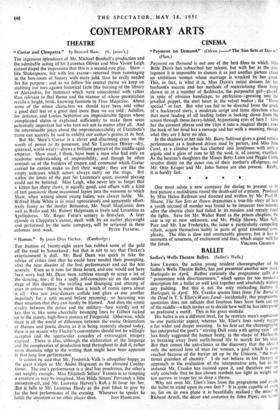CONTEMPORARY ARTS
THEATRE
Caesar and Cleopatra." By Bernard Shaw. (St. James's.) THE ingenious splendours of Mr. Michael Benthall's production and the admirable acting of Sir Laurence Olivier and Miss Vivien Leigh cannot dispel the impression that this is a second-rate play. Shaw— like Shakespeare, but with less excuse—returned from rummaging in the box-room of history with more juhk than he really needed for his purpose ; and as we follow his central theme we keep on stubbing our toes against historical facts (the burning of the library at Alexandria, for instance) which were coincidental with rather than relevant to that theme and the manner of whose presentation recalls a bright, brisk, knowing footnote in Time Magazine. About some of the minor characters we should have been told either a good deal less or a great deal more than we are told ; Achillas, for instance, and Lucius Septimius are imponderable figures whose complicated status is explained sufficiently to make them seem potentially important but who turn out not to matter after all. And the interminable jokes about the unpronounceability of Ftatateeta's name can scarcely be said to exhibit our author's genius at its best.
But Mr. Shaw's Caesar is a clever and disarming essay on the worth of power to its possessor, and Sir Laurence Olivier—dry, quizzical, world-weary--draws a brilliant portrait of the middle-aged emperor. Shaw must, I think, have been a man who had only an academic understanding of responsibility, and though he often reminds us of the burdens of empire and command which Caesar carried he cannot make us feel their weight ; they are like the empty suitcases which actors always carry on the stage. But within the limits of the part Sir Laurence's quiet, assured playing could not be bettered. Miss Leigh, who never lets us forget that a kitten has sharp claws, is equally good, and offsets with a kind of tart ganzinerie those occasional lapses into the winsome to which Shaw, when writing about young ladies, was always liable. Mr. Wilfred Hyde White is as usual uproariously and apparently effort- lessly funny as the insular Britannus, Mr. Neal! MacGinnis does well as Rufio and Mr. Robert Helpmann is lively and Levantine as Apollodorus. Mr. Roger Furse's scenery is first-class. A later episode in Cleopatra's career, dealt with by an earlier playwright and performed by the same company, will be reviewed in these






































 Previous page
Previous page